
Rattan L. Khosa SeedCon
Introductory Remarks // 8:15am - 8:50am

Rattan L. Khosa, ’79
CEO and Founder, AMSYSCO
Rattan L. Khosa, ’79
CEO and Founder, AMSYSCO
Rattan Khosa, MBA ’79, started AMSYSCO in 1981 out of the basement of his home that he shared with his wife and young son, with lifetime savings of $44,000 and no other financing. After nearly four decades, he has grown it into a highly profitable company that provides post-tensioning systems on commercial structures, and occupies a 55,000 square foot facility; the company captures some 65% market share.
“Starting a business from scratch is like jumping off a cliff in the middle of the night while blindfolded, hoping that there is a safety net down below,” Khosa said.
“When more than 80 percent of companies fail within the first year – even those with ample funding – it’s clear that there is much more to a startup’s success than just money,” Khosa said. “I don’t simply want to provide the money for this new program; I plan to serve as a thought leader, mentor and guide for these aspiring entrepreneurs, so that my years of experience, my struggles and my successes may serve as an additional resource to help them succeed.”
“I know from personal experience that everyone needs help at some point in their lives. No one has succeeded on their own.”
Khosa is actively involved with the Polsky Center as a member of its advisory board, the Polsky Council.

Starr Marcello, MA ’04, MBA ’17
Deputy Dean for MBA Programs, Chicago Booth
Starr Marcello, MA ’04, MBA ’17
Deputy Dean for MBA Programs, Chicago Booth
As Deputy Dean, Starr oversees the Full-time, Evening, and Weekend MBA Programs, as well as the work of the Polsky Center and Rustandy Center at Booth. Prior to her role as Deputy Dean, Starr was the Executive Director of the Polsky Center, working with University of Chicago students, faculty, and staff to launch the next generation of high-impact ventures. She grew the entrepreneurship program at the University of Chicago from 2005 to 2020, and continues to champion the Center’s work today.
During Starr’s time as Executive Director at Polsky, she ran and expanded the Edward L. Kaplan New Venture Challenge (NVC), which awards over $1M in funding and services to top entrepreneurial companies each year. The NVC is ranked the #1 university accelerator program in the nation. Since 1996, the NVC has fostered more than 800 startups, with 180+ that are still in operation and growing strong, has created thousands of jobs, and has produced exits of over nearly $6 billion, including Grubhub (NYSE: GRUB) and Braintree Venmo (acquired by eBay’s PayPal for $800 million). In 2017, Starr testified before the U.S. Congress’ Committee on Small Business on the role of accelerator programs in creating new jobs and positively influencing economic development.
Fireside Chat with Evan Moore // 2:30pm - 3:30pm ( Closing Remarks & Happy Hour to follow)
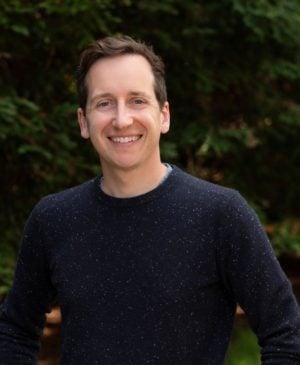
Evan Moore
Independent Investor & Cofounder of DoorDash
Evan Moore
Independent Investor & Cofounder of DoorDash
Evan is an investor and entrepreneur. After starting his career in the music industry, he attended Stanford’s Graduate School of Business, where he cofounded DoorDash. He served on the founding team of Opendoor and then joined Khosla Ventures as a Partner, where he led financings in over 20 startups, from seed to growth stage.
He currently angel invests in 10-15 companies per year.
State of Consumer Businesses Panel // 9:00am - 10:00am

Mia Saini Duchnowski
Managing Director, Cantor Fitzgerald // Entrepreneur-in-Residence
Mia Saini Duchnowski
Managing Director, Cantor Fitzgerald // Entrepreneur-in-Residence
Mia Saini Duchnowski is a journalist, engineer, investor, and a successful entrepreneur who sold her first VC-backed company, Oars + Alps, to SC Johnson. Currently, she serves as the cofounder and Board Member of Oars + Alps, a digitally native skin care brand for people who lead an active, on-the-go lifestyle. The products are made with naturally-derived, premium ingredients and are sold on Target and Amazon to name a few. The company launched in 2015 after Mia quit her high-profile job as a TV reporter/anchor with Bloomberg TV, one of the largest financial TV networks in the world.
Mia spent over three years with Bloomberg TV in Hong Kong and in New York City where she was responsible for global economic, political and business coverage. She was the first person at the network to interview the chairman of Microsoft, John Thompson, after he became chairman. She’s interviewed hundreds of CEOs and heads of states including the former CEO of Burberry, Angela Ahrendts, and Virgin founder, Sir Richard Branson. She’s routinely covered breaking news stories, such as the disappearance of MH 370, Nelson Mandela’s death, and Steve Job’s passing.
Prior to joining Bloomberg in June 2011, Mia served as an anchor and reporter for Forbes TV. She reported from the World Economic Forum in Davos, Switzerland as well as interviewed prominent business leaders including Warren Buffett, former FDIC Chairman Sheila Bair, Blackstone co-founder Pete Peterson, former Bear Stearns CEO Ace Greenberg, SAP CEO Bill McDermott and more. Earlier in her career, Mia was a financial analyst at Goldman Sachs, working in hedge fund sales and marketing. There, she helped establish strategic relationships with hedge funds representing over $1.2 billion in portfolio value.
Mia earned an MBA from the Harvard Business School. She earned a double major from the Massachusetts Institute of Technology (MIT) in neuroscience and media studies, and a double minor in civil engineering and management science. While at MIT, she interned at NASA Ames Research Center doing artificial intelligence research. She was featured in Glamour Magazine as one of their Top Ten College Women in 2004.
Mia was named as one of Crain’s Magazine 40 Under 40 in 2020 and was the emcee for the 2020 TedX Wrigleyville event. Currently, she sits on the Auxiliary Board of the Chicago Lincoln Park Zoo. Mia actively interviews high school seniors looking to study STEM subjects at MIT. She is also active in the Chicago startup ecosystem and enjoys mentoring students. She loves cycling and watching film noir movies and lives in Chicago with her husband and their five kids: Tabytha, Thiesson, Kempson, Aubrienna and Sienna.

Rick Desai
Managing Partner, Listen
Rick Desai
Managing Partner, Listen
Rick Desai is a Managing Partner at Listen, a brand-focused venture capital firm in Chicago. At Listen, Rick leads investment strategy, sourcing, and diligence and works closely with portfolio companies on marketing and technology initiatives. Rick previously co-founded Dashfire, a startup studo that launched 40+ companies and is currently an adjunct entrepreneurship lecturer at Kellogg.

Gabriel Huertas Del Pino, MBA ’24
CEO, Arch Pet Foods
Gabriel Huertas Del Pino, MBA ’24
CEO, Arch Pet Foods
Gabriel Huertas del Piño is the chief executive officer of Arch Pet Foods. In 2022, del Pino cofounded Arch to make hypoallergenic dog food with plant-and insect-based proteins. He has experience as a licensed attorney with experience in early-stage impact investing and CPG sales/strategy. Gabriel graduated from Wake Forest University with a BA in philosophy and Spanish, holds a JD from American University, and an MBA from Chicago Booth.

Shivani Jain, AB ’13
Cofounder and CMO, Cubii
Shivani Jain, AB ’13
Cofounder and CMO, Cubii
Shivani is an entrepreneur & investor, who co-founded her first fitness company, Cubii, while she was a student at The University of Chicago. Cubii is focused on building safe, low impact, home fitness products for seniors & people going through rehabilitation. The company was an Inc 500 fastest growing company for three consecutive years & successfully sold to a private equity firm.
Most recently, she’s a new mom to two young kids, teaching her more patience & resilience than building a company ever did!

Aaditi Tamhankar
Analyst, Bluestein Ventures
Aaditi Tamhankar
Analyst, Bluestein Ventures
Aaditi Tamhankar is an analyst with Bluestein Ventures, where her responsibilities include engaging with startups, due diligence analysis, and supporting portfolio companies.
Prior to Bluestein, Aaditi was at Emerton, a global consulting firm, where she honed her analytical skills, working with food, energy, and infrastructure companies on applying a strategy-led approach to operating and business models. During undergrad, Aaditi held internships at Plant-Based Solutions and Ocean Hugger Foods, where she identified new market opportunities and delved into industry trends to inform growth strategy.
Aaditi graduated from Wharton with a BS in economics, magna cum laude.
State of Tech & AI Panel // 9:00am - 10:00am

Jason Heltzer, MBA ’02
Managing Partner, Origin Ventures // Adjunct Professor of Entrepreneurship, Chicago Booth
Jason Heltzer, MBA ’02
Managing Partner, Origin Ventures // Adjunct Professor of Entrepreneurship, Chicago Booth
Jason Heltzer began his career in venture capital in 2001 and is currently a managing partner at Origin Ventures. Heltzer is a board member or observer for Tovala, Vivrelle, Prisidio, Idelic, Blackcart, and several unannounced investments.
Heltzer’s prior investments include Tock (acquired by Squarespace), Cartavi (acquired by Docusign), Base CRM (acquired by Zendesk), Brightnest (acquired by Angie’s List), Alert Logic (acquired by Welsh-Carson), and FeeFighters (acquired by Groupon). Heltzer also worked closely with TradeKing (acquired by Ally Bank). Before his venture capital career, Heltzer spent three and a half years as a software engineer and software architect for Deloitte Consulting. He also led engineering and business teams at 1stUp, a San Francisco-based startup.
Heltzer received a BS in computer science, with highest distinction, from the University of Michigan. Heltzer also received an MBA in finance and entrepreneurship, with high honors, from Chicago Booth, where he was a Siebel Scholar and Wallman Scholar. In addition to his professional responsibilities at Origin, Heltzer is an adjunct professor of entrepreneurship at Chicago Booth, where he teaches the venture capital and private equity lab class.
Jason has an interest in movies, and has watched every Best Picture movie from 1927 to present, plus about 200 documentaries. In addition, for most of his life, Jason has been addicted to video games, which is what prompted him to teach himself how to code when he was 13.

Stella Garber, MBA ’15
Co-Founder & CEO, Hoop
Stella Garber, MBA ’15
Co-Founder & CEO, Hoop
Stella Garber is co-founder and chief executive officer of Hoop, the AI-powered task manager for busy professionals. Hoop connects to email, chat and meetings to automatically generate and aggregate tasks across tools. Previously, Stella was the vice president of marketing at Trello where she came on as the first marketer and helped grow the company through Atlassian’s $425 million acquisition of Trello in 2017 and beyond.
Stella is an active angel investor in 32 companies and advises startups and venture funds. While at Booth, Stella won the New Venture Challenge in 2013.
Stella holds a BA in psychology from Northwestern University and an MBA ’15 from Chicago Booth.

Josh Lockhart
Chief Technology Officer, Aeropay
Josh Lockhart
Chief Technology Officer, Aeropay
Josh Lockhart is the chief technology officer (CTO) at Aeropay, a financial technology company specializing in bank-to-bank (ACH) transfers. He joined Aeropay in May 2024, bringing extensive experience from his previous roles at PayPal, Braintree, and as vice president of engineering at GoFundMe. A native of Chicago, Josh is committed to leveraging his expertise to enhance Aeropay’s technological capabilities and drive innovation in the payments industry.
It’s important to note that Aeropay and Aeroplay are distinct entities. Aeropay focuses on financial technology solutions, while Aeroplay Entertainment provides in-flight entertainment services. As of now, there is no publicly available information indicating that Josh Lockhart holds a CEO position at Aeroplay Entertainment.
Josh holds a BS in computer science from University of Illinois Springfield.

Karthee Madasamy, MBA ’06
Founding Managing Partner, MFV Partners
Karthee Madasamy, MBA ’06
Founding Managing Partner, MFV Partners
Karthee Madasamy is the founding managing partner at MFV Partners, a Silicon Valley based, early-stage deep tech venture fund targeting technology startups disrupting traditional industries like logistics, automotive, manufacturing, and others. Karthee invests in frontier-tech startups in robotics, artificial intelligence, energy, quantum computing, and data platforms. He represents MFV Partners’ investments in PsiQuantum (Quantum Computing Hardware), Agility Robotics (Humanoid Robotics for Manufacturing), and Sun Mobility (EV Tech platform), among others.
Before MFV, Karthee spent 11 years as a corporate vice president and managing director at Qualcomm Ventures, where he invested across the US, Israel, and India. He started Qualcomm Ventures’ investment activities in both Israel and India. Some of his notable investments include Waze (acquired by Google), MapMyIndia (NSE: MAPMYINDIA), Validity Sensors (acquired by Synaptics), and BORQS (NASDAQ IPO), among others. He continues as an independent director at MapMyIndia.
Before Qualcomm Ventures, Karthee led technical and product marketing roles in three semiconductor and wireless startups in Silicon Valley, specializing in 3G, WiFi, and bluetooth.
Karthee has a bachelor’s in electronics and communication engineering from the College of Engineering, Guindy in Chennai, India, and a master’s in electrical engineering from the University of Michigan. Karthee also holds an MBA from Chicago Booth. Karthee is also a Kauffman Fellow.

Ali Mahmoud, MBA ’21
Principal, Glasswing Ventures
Ali Mahmoud, MBA ’21
Principal, Glasswing Ventures
Ali Mahmoud is a principal at Glasswing Ventures. In his role, he is responsible for sourcing, investing in, and supporting AI-native applications of software and frontier technology in the enterprise markets. His governance experience includes Observer roles on the Boards of Ship Angel, FeatureByte, Verusen, Labviva, CloudTruth, Zylotech (acquired by Terminus), and Plannuh (acquired by Planful).
Prior to Glasswing, Ali worked on the investment teams of Morpheus Ventures and Lightbank, focusing on early-stage B2B technologies across a variety of sectors. Prior to venture capital, Ali served as head of business development and founding team member at SixPlus. He built out the sales, marketing, and business development functions. Ali started his career at EY, where he worked with global teams on advisory and financial statement audit engagements for the financial services industry.
Ali graduated summa cum laude from University of Massachusetts Amherst with a BBA in accounting and holds an MBA from Chicago Booth.
State of Healthcare Panel // 10:10 - 11:10am

Dipa Mehta, MBA ’12
Co-Founder and Managing Partner, Valeo Ventures
Dipa Mehta, MBA ’12
Co-Founder and Managing Partner, Valeo Ventures
Dipa is a cofounder and managing partner at Valeo Ventures. Valeo is the exclusive investment manager for Cobalt Ventures, the strategic venture capital arm of Blue Cross and Blue Shield of Kansas City. She sits on the boards of Bicycle Health, Handspring Health, MedArrive, OncoHealth, and Spectrum.AI. Valeo is building a new venture capital fund partnering with hospital systems and health plans to create bespoke corporate venturing vehicles.
Dipa formerly led Corporate Development and Ventures group at Advocate Health Enterprises (AAE), an Advocate Health subsidiary that aims further the AH mission to help people live well by advancing innovative solutions that go beyond traditional clinical care. She led investments into Foodsmart, Xealth, and acquisitions into companies helping seniors to age in their home for longer. Dipa was also previously a managing director at Sandbox Industries, a venture capital firm which is the investment manager to the Blue Venture Fund. During her time at Sandbox, Dipa served on the boards of Contessa Health, Upward Health, Oncology Analytics, AbleTo, and Lumiata. Prior to Sandbox, Dipa was at Amgen Ventures, the corporate venture fund of Amgen. Dipa started her career in the Global Healthcare Group at UBS and the Healthcare Fund at Paul Capital Partners, which invested in late-stage pharmaceutical and biotechnology companies.
Dipa holds a BS from the New York University Stern School of Business and an MBA from Chicago Booth where she received the Chicago Booth Leadership Award of Distinction. She has also completed the Kauffman Fellowship, a prestigious two-year program for venture capitalists. Dipa is currently an investor in residence with the Polsky Center for Entrepreneurship at Booth where she advises students and teaches workshops.
Dipa lives in Chicago with her husband and twin boys.

Eric Alvarez
Founder & CEO, Grapefruit Health
Eric Alvarez
Founder & CEO, Grapefruit Health
Eric Alvarez is the founder and chief executive officer of Grapefruit Health, an innovative startup addressing the healthcare workforce shortage in the United States. As an alumni of Rush University, where he also serves as adjunct faculty, Eric brings valuable knowledge to his role.
Eric’s diverse background includes service in the United States Air Force as an aviation electrical and environmental systems specialist on C-5 aircraft. His also has extensive hospital administration experience at UChicago and Northwestern, as well as prior startup experience as chief operating officer of Cloud-based/SaaS Enterprise Healthcare Solutions Company Fibroblast, which was acquired by Cerner.
Under Eric’s leadership, Grapefruit Health is pioneering a unique approach to healthcare staffing by creating the first national workforce composed entirely of clinical students. The company recruits, trains, and manages these students to perform remote work for healthcare organizations through proprietary software. Eric’s innovative approach has led to several achievements for Grapefruit Health, including being selected for the Amazon Web Services Healthcare Accelerator: Global Cohort for Workforce.
Driven by a passion for solving complex problems and making a positive impact, Eric Alvarez is at the forefront of addressing critical challenges in the healthcare industry while providing valuable opportunities for clinical students.
Eric holds a master degree in health systems management from Rush University.

Meghan Doyle
CEO and Cofounder, Partum Health
Meghan Doyle
CEO and Cofounder, Partum Health
Meghan Doyle is the CEO and cofounder of Partum Health, where she combines her deep experience in consumer health with her passion for supporting women and families. Prior to founding Partum, Meghan was a senior principal at Boston Consulting Group where she partnered with leading health systems, payers and health services clients to develop and launch growth strategies.
She is also a mom, and was inspired to found Partum after an underwhelming maternal care experience that included cobbling together her own pre and postnatal specialty care. Meghan has an MBA from the Wharton School at the University of Pennsylvania and a BA from UNC-Chapel Hill.

Alyssa Jaffee, MBA ’16
Partner, 7wire Ventures
Alyssa Jaffee, MBA ’16
Partner, 7wire Ventures
Alyssa Jaffee is a partner at 7wireVentures where she invests in companies that empower everyone to be better stewards of their health. She holds board roles at Caraway Health, NOCD, MedArrive, Brightline, Zerigo Health, and Jasper Health. Previously, Alyssa was an investor at Pritzker Group Venture Capital and Hyde Park Angels. Alyssa is also a cofounder of TransparentCareer, a NVC winning company helping people make more data-driven career decisions. Alyssa spent time at the Advisory Board Company where she launched new technologies and consulted hundreds of hospital executives to understand their needs and recommend solutions.
Alyssa attended the University of Wisconsin-Madison and received an MBA from Chicago Booth. Her work and accomplishments have been featured in Fortune, Stat News, MedCity News, Crain’s, and more.

Tunde Oshinowo, MBA ’19
Vice President, Portfolio Growth, Sandbox Healthcare
Tunde Oshinowo, MBA ’19
Vice President, Portfolio Growth, Sandbox Healthcare
Tunde Oshinowo is a vice president, portfolio growth for Sandbox Healthcare. He supports the Blue Venture Fund’s investments in Lumeris, First Dollar, tango, and HeartFlow.
Prior to Sandbox, Tunde was an associate at Abundant Venture Partners, where he focused on digital health and senior care. Tunde started his career in digital product design at Next College Student Athlete, the largest athletic recruiting network in the US.
An NFL alumni, Tunde played professional football for four years following his time at Stanford University, where he received a BS in electrical engineering. Tunde holds an MBA from Chicago Booth.
State of Social Impact Panel // 10:10 - 11:10am

Sofia Bever
MBA Candidate, Chicago Booth School of Business // MBA Venture Fellow, Impact Engine
Sofia Bever
MBA Candidate, Chicago Booth School of Business // MBA Venture Fellow, Impact Engine
Sofia Bever is second-year MBA student at Chicago Booth, where she co-leads the Entrepreneurship & Venture Capital and Net Impact student groups. She is currently a venture fellow at Impact Engine, investing in venture and growth stage startups improving education and employment outcomes across the lifespan. She also serves as an entrepreneur-in-residence for Seed Stage Startup Aura Finance (TechStars ’23), a psychology-based financial wellness platform for employees, where she supports sales and fundraising activities. Prior to Booth, Sofia was a growth strategy manager at Accenture, co-creating strategies with F500 and global nonprofit executives in NYC. Sofia holds bachelor’s degrees in biochemistry and business administration from the University of Florida, where she was awarded the Presidential Service Award (<0.1% of students) for committing 400+ hours to serving local education and healthcare nonprofit organizations.
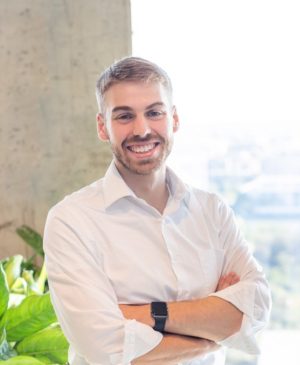
Will Blanchard
Founder, WattShift
Will Blanchard
Founder, WattShift
Will Blanchard is the founder and CEO of WattShift, an energy data and software provider enabling cheaper, greener energy for homes across America by optimizing smart energy devices for grid incentive schemes. Will has worked for more than 8 years in the smart home and energy device industry — founding CyberPowered Home to build smart load panels during undergrad, serving as the thermostat and demand response product manager at Alarm.com, and then as a senior PM for energy data at a seed to Series A startup.
Will came to Booth as a member of the full-time class of ’24 to begin working on what has become WattShift. After competing in NVC his first spring (’23), Will decelerated and is now in the Booth part-time program. He earned his undergraduate degree from Washington University in St. Louis, where he triple majored in Computer Engineering, Systems Engineering, and Economics and Strategy.

Fernando Carranza
Venture Capital Investor, Cleveland Avenue
Fernando Carranza
Venture Capital Investor, Cleveland Avenue
Fernando Carranza is a venture capital investor with Cleveland Avenue’s CAST US Fund, where he invests in tech-driven businesses led by founders from under-resourced communities that can catalyze systemic change.
Before joining Cleveland Avenue, Fernando was a director of venture at Digital Currency Group in New York City, helping to shape the future of decentralized finance. His career began in investment banking at Société Générale where he advised companies on financing strategies, mergers, and acquisitions, across the US and EMEA regions. Fernando left Société Générale to lead the first Latinx-focused incubator in the US at 1871 Chicago, and later joined Agora Partnerships in Mexico City as an impact investor.
Fernando graduated with a BS in Finance from the University of Illinois at Urbana-Champaign. Fernando also received his MBA from the Kellogg School of Management as a Toigo Foundation Fellow, MLT Fellow, and ICM Mosaic Fellow.

Sara Chamberlain, MBA ’09
Cofounder and Managing Director, Earth Foundry
Sara Chamberlain, MBA ’09
Cofounder and Managing Director, Earth Foundry
Sara Chamberlain is co-founder & managing director at Earth Foundry, an early-stage venture capital firm which has backed some of the most transformative energy and cleantech companies. Sara is the driving force of the firm, leading investment activity and actively building cutting edge companies including Advanced Diamond Technologies (acquired by SMIN), Azumo, e-Zinc, Intelihot, NanoGraf, Network Perception, Polystyvert, Tank Utility (acquired by Generac), and Volexion.
Prior to Earth Foundry, Sara built government advisory practice at Wilson Sonsini Goodrich & Rosati and helped climate tech startups raise $300M in non-dilutive funding. She also held roles with GE Energy and environmental consulting firm, GaiaTech.
Sara is an advocate for the ecosystem and serves on the Investment Committee for accelerator Evergreen Climate Innovations, an incubator program at Argonne National Laboratory, and as an executive-in-residence at the Rustandy Center-Chicago Booth. Fortune recently recognized Sara as a Top Seed Stage Climate VC to watch, and in 2015 by Midwest Energy News “40 under 40.”
Sara currently sits on the board of Earth Foundry portfolio companies 3E Nano, Azumo, e-Zinc, Harvest Thermal, Polystyvert, and Volexion.
Sara earned an undergraduate degree from Emory University and an MBA from Chicago Booth.
State of FinTech Panel // 11:20am - 12:20pm

Catherine Green
MBA Candidate, Chicago Booth School of Business

Sean Harper, MBA ’09
CEO & Founder, Kin Insurance
Sean Harper, MBA ’09
CEO & Founder, Kin Insurance
Sean Harper is the CEO and co-founder of Kin Insurance. Founded
in 2016, Kin is working at the intersection of software and insurance to bring more affordable insurance options to homeowners in catastrophe-prone regions. Sean holds a bachelor’s in economics and an MBA from the University of Chicago.

Meenakshi Lakshmanan, MBA ’21
CEO & Founder, Manifest
Meenakshi Lakshmanan, MBA ’21
CEO & Founder, Manifest
Meenakshi is the Co-founder and CTO of Manifest, a fintech startup transforming the way individuals consolidate and manage retirement accounts. Before founding Manifest, she spent over 12 years at Goldman Sachs, building innovative technology solutions for the financial sector. Passionate about the intersection of technology and finance, Meenakshi is committed to building accessible and impactful solutions that empower financial security.
Meenakshi earned her MBA from the University of Chicago Booth School of Business in June ’21. She was a founding member of the E/W FinTech Club and won the 2018 Edward L. Kaplan, ’71, New Venture Challenge for Manifest. She also holds a Bachelor’s and Master’s degree in Computer Science.

Kelsey Landau, MBA ’21
Principal, Alloy Alchemist Fund
Kelsey Landau, MBA ’21
Principal, Alloy Alchemist Fund
Kelsey manages our active portfolio of investments in fintech and
related companies. She also tracks and monitors relevant fintech
companies for potential partnership and investment opportunities for
Alloy Labs members. She conducts due diligence and market and
financial analysis.
Before joining Alloy Labs she was an Investment Banking Associate
at Citigroup Global Markets, where she led day-to-day transaction
coverage, including ratings analytics, investor outreach, relationship
management, and syndicate coordination.
Kelsey graduated cum laude with BS in business administration from
the University of Florida’s Warrington College of Business, and she
holds an MBA from the University of Chicago Booth School of
Business.
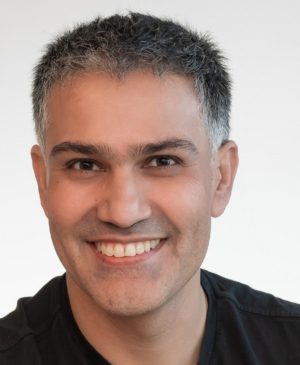
Saurabh Sharma, MBA ’10
Partner, Jump Crypto
Saurabh Sharma, MBA ’10
Partner, Jump Crypto
Saurabh Sharma is a General Partner at Jump Capital and Head of Investments at Jump Crypto where he invests across Centralized & Decentralized Infrastructure, Open Finance and Web3 primitives as well as lead various R&D initiatives. Saurabh has been instrumental in setting up and scaling Jump’s crypto investing efforts and has witnessed closely the rise of this technology paradigm and asset class. Saurabh enjoys studying new token driven economic models and how those could enable more democratized access to infrastructure and services.
Saurabh started his career as a High-Performance Computing Researcher at French National Research Institute, worked as a quant trader with Lehman Brothers and led data science, operations, and product teams at Groupon. Saurabh received a Master’s in Computer science from Cornell University and an M.B.A. from The University of Chicago Booth School of Business.
State of Venture Capital Panel // 11:20am - 12:20pm

Allison Weil Lechnir, MBA ’17, MPP ’17
Partner, Hyde Park Venture Partners
Allison Weil Lechnir, MBA ’17, MPP ’17
Partner, Hyde Park Venture Partners
Allison is a Partner at Hyde Park Venture Partners and has been with the firm since 2019.
Prior to HPVP Allison ran business operations for Civis Analytics, a Chicago-based data science software startup. She also co-founded Flag Analytics, a predictive analytics company focused on public safety, and spent her early career in healthcare consulting at Accenture. She is a 2017 MBA/MPP from the University of Chicago.

Kristina Chapple
General Partner, 11 Tribes Ventures
Kristina Chapple
General Partner, 11 Tribes Ventures
Kristina Chapple is a General Partner at 11 Tribes Ventures- an
early-stage fund that proactively invests in the resilience of their founders. In the industry, she is known for asking thoughtful and empathetic questions that challenge conventional approaches to diligence and post-investment support.
Kristina joined 11 Tribes as the first hire, helping the firm grow by deploying the remaining checks from Fund I ($11M) and supporting the Fund II raise ($40M). She is the “front door” of the firm, responsible for bringing 11 Tribes to market to source founders and assess companies through diligence. Thus far from Fund II, Kristina has led investments in companies like Alloy Market, LegalKarma, GoNanas, Nutrad, LeaseUp, and Circadian Risk.
Under her leadership, 11 Tribes is crafting an academically-verified organizational health study and reimagining the founder experience from the first call through to exit. Founders consistently describe 11 Tribes as “the VC that truly cares about them,” and Kristina is proving that healthy founders lead to healthy returns and business outcomes do not have to come at the expense of the founder

Alex Chung, MBA ’22
Investor, Chai Ventures
Alex Chung, MBA ’22
Investor, Chai Ventures
Alexandra (Alex) Chung is an Investor at Chai Ventures, where she invests in high-potential, women-led startups across consumer, healthcare, and the future of work sectors. Passionate about supporting early-stage companies, she has curated impactful deal flow, fostered strategic partnerships, and contributed to successful initial investments that align with Chai Ventures’ mission to empower women entrepreneurs. Her previous experience includes roles at Decibel, Fortress, and Loeb.nyc, where she honed her ability to identify high-growth opportunities and develop go-to-market strategies for transformative companies.
Alex earned her MBA from the University of Chicago Booth School of Business and a BA in Philosophy with Allied Fields from the University of Chicago. Outside of work, she is a dedicated runner, having completed the NYC Marathon while raising funds for Tackle

Sonia Nagar
Managing Partner, SNAK Venture Partners
Sonia Nagar
Managing Partner, SNAK Venture Partners
Sonia worked for Amazon 15+ years ago as part of the team that launched the clothing category. She then co-founded a venture-backed mobile shopping startup that was acquired by RetailMeNot, at the time the largest digital coupon marketplace in the U.S.. She led the mobile team at RetailMeNot for 2 years before joining Pritzker Group Venture Capital where she was a General Partner. At PGVC her marketplace investments included Backlot Cars, Cameo, Coinbase, ShopThing, Machinery Partner, Maisonette, Yay Lunch, Batch and FuelMe. Sonia started her career as an engineer at General Motors in their advanced engineering group.

Vikram Venkat, MBA ’22
Investor
Vikram Venkat, MBA ’22
Investor
Vikram is a VC investor based in the Bay Area. He was most recently at Rocketship.vc, a generalist early-stage investment firm with portfolio companies across 14 countries and most major industry sectors. At Rocketship, Vikram led 10+ investments and worked closely with portfolio companies on several key projects. Prior to Rocketship, Vikram worked at the Boston Consulting Group for over four years, and had short stints in investing with Jump Capital and the 49ers Enterprises, as well as in marketing at Ecolab. He holds an undergraduate engineering degree from the Indian Institute of Technology, Madras, and an MBA from The University of Chicago Booth School of Business.
Workshop: How to Pitch with Melissa Harris // 1:30pm - 2:15pm
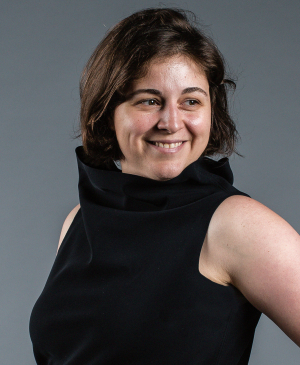
Melissa Harris, MBA ’16
CEO, M. Harris & Co. // Entrepreneur-in-Residence, Polsky Center
Melissa Harris, MBA ’16
CEO, M. Harris & Co. // Entrepreneur-in-Residence, Polsky Center
Melissa Harris is the founder and CEO of Chicago-based marketing agency, M. Harris & Co. Its job: Make its clients unforgettable.
With Pulitzer Prize winner Mary Schmich, she also owns media company Mary & Melissa Productions, which is producing an upcoming seven-part limited podcast series in partnership with PRX.
Simon & Schuster publish3e her first book, Everybody Needs an Editor, in September 2024.
After founding her the agency in 2016, it quickly began racking up awards. She was part of the 2018 Clio Award-winning team behind the Cards Against Humanity Saves America campaign, as well as the 2017 Reed Award from Campaigns & Elections for best earned media, and a 2017 Golden Trumpet Award from the Publicity Club of Chicago.
The firm operates on the reputation and experience of its team members: Its 50-and-growing collaborators comprise former top editors and reporters; Netflix film directors; Pulitzer Prize and James Beard Award winners.
Harris began her career as a journalist, capping 15 years in media as a business columnist for the Chicago Tribune. While earning her MBA from the University of Chicago Booth School of Business, she joined a real estate private equity firm, where as vice president of marketing she helped raise more than $70 million and launched its online investing platform.
Harris also holds degrees from Johns Hopkins University and Northwestern University. In addition to her position as Adjunct Assistant Professor of Entrepreneurship, she serves as Entrepreneur-in-Residence at the Polsky Center for Entrepreneurship and Innovation, where she frequently teaches seminars and advises startups on marketing and communication. She also serves as a governing board member for The Bulletin of the Atomic Scientists.
Workshop: Financial Modeling and Strategic Planning Workshop with Scott Walbrun // 1:30pm - 2:15pm

Scott Walbrun, MBA ’19
Principal, BMW i Ventures
Scott Walbrun, MBA ’19
Principal, BMW i Ventures
Scott Walbrun is a principal venture capital investor at BMW i Ventures, the independent venture capital fund managed on behalf of BMW Group based in Silicon Valley, where he focuses on Series A & B investments around the future of mobility, energy, artificial intelligence. In this capacity, Scott has served on the board of eight companies. He also serves as a mentor and workshop leader for hundreds of startups through various accelerator programs across the country.
Prior to joining BMW i Ventures, Scott provided M&A and capital markets advisory as a member of Jefferies’ Technology Investment Banking team. Scott joined Jefferies after completing his MBA at the University of Chicago Booth School of Business. While completing his MBA, he worked at Kinzie Capital Partners evaluating private equity investments, as well as at the Polsky Center for Entrepreneurship and Innovation supporting the commercialization of science-based and deep tech companies.
Prior to business school, Scott managed Strategic Finance and FP&A at Truck Hero (a TA Associates portfolio company) and began his career in Fiat Chrysler’s Finance Leadership Development Program.
Founders' Room // 1:30pm - 2:15pm
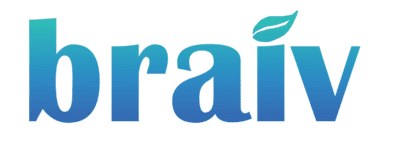
BRAIV
BRAIV
BRAIV is eliminating the guessing game of prescribing psychiatric medications for conditions such as Depression and Anxiety through Machine Learning and Big Data. Get better, faster, with BRAIV.
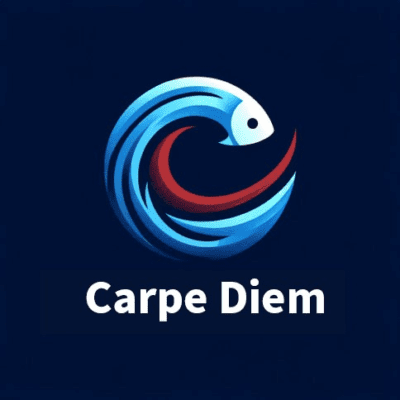
Carpe Diem
Carpe Diem
Carpe Diem is a snack company that seizes the day to wipe out invasive species by turning them into the tastiest treats. We create the best tasting protein snacks that also happen to be sustainable by using invasive species, such as Asian Carp, as our main ingredients. Our products make it easy for consumers to eat snacks that are healthier, tastier and remove invasive species from the environment.

Cyclical
Cyclical
Cyclical is revolutionizing the way female hormonal cycles are understood in society as part of the rapidly-growing FemTech industry that has taken off in recent years. Female hormonal cycles affect our lives every day, yet are severely under-utilized by those who could benefit from it the most. Our mission is to build an actionable + educational app that helps all women understand their monthly hormonal cycle, providing bite-sized guidance on nutrition, activity, and mind, and all in accordance to their cycles.

Doulala
Doulala
Doulala is a virtual AI-powered pregnancy companion that is a woman’s one-stop shop for reliable and personalized information, recommendations, and resources through guided prompts and conversational, natural language input from users.

MOOJ Foods
MOOJ Foods
MOOJ Foods is a South Asian health foods company focused on reimagining traditional staples with a modern, nutritious twist. Our first product is a high-protein paneer, which will be the highest protein density meat alternative - soon to be on the market.

Mudita Earth
Mudita Earth
Mudita Earth is a clean, plant-based skincare brand focused on the needs of melanin-rich skin. We are currently sold in 200 stores and Amazon.

Oro Intelligence
Oro Intelligence
ORO Intelligence is a healthcare tech startup that empowers provider organizations to increase annual revenue and see more patients by maximizing provider utilization. Our AI-powered Digital Assistant automates scheduling and waitlist management to reduce no-shows and fill schedule gaps within minutes of a cancellation.

PAC Dynamic
PAC Dynamic
The Virtual Patient Simulator (VPS) by PAC Dynamic uses a patients unique cardio-energetic profile to accurately identify and model the trajectory of patients living with heart failure. Using hemodynamic data, the VPS defines the energetic tipping point for the patient and uses this information to clinically guide device and medical therapy for patients with advanced heart failure.

Rayni
Rayni
Rayni helps scientists in the life sciences operate their instruments with complete confidence through fast, reliable, and personalized AI-powered guidance.

relos
relos
relos facilitates residential real estate transactions by converting purchase contracts into actionable, interactive timelines for realtors, their clients, and other stakeholders resulting in faster, compliant closings.
